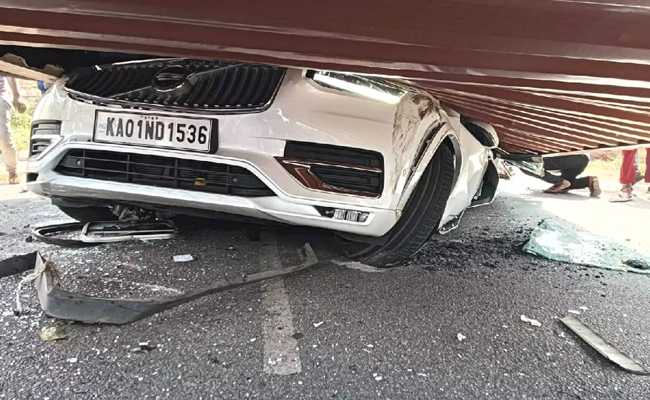Bengaluru (PTI): The driver of the truck involved in the accident in Nelamangala which killed six people, claimed on Monday that there was a car ahead of his vehicle and to prevent collision, he turned the steering wheel towards the road divider which led to the accident.
Police, however, refused to share details about the investigation, claiming it will hamper their probe.
According to police, a Deputy Superintendent of Police rank officer is investigating the case and said a detailed investigation is being carried out to ascertain the cause of the accident. The CCTV cameras installed in and around the area of the accident site are also being verified as part of the probe.
"A DYSP rank officer is investigating the case. We are also doing a case study, keeping in mind the road safety aspects as well. At this stage, we do not want to reveal any details which would further hamper the probe," a senior police officer said.
Speaking to reporters, the Jharkhand-based truck driver, Arif, who was hospitalised with injuries sustained during the accident, claimed that there was a car ahead of his truck, and that he was going at 40 kmph.
"The car driver applied sudden brakes and I lost control of my vehicle. To save the car, I turned the steering wheels towards the road divider on the right. But then I saw another car, and took a left again. Due to this, the container which was loaded with steel fell," he added.
The truck driver was unaware that a SUV car got crushed beneath his vehicle and that it led to the death of six of the family, police said.
The accident occurred at Nelamangala near Talekere on the Bengaluru outskirts last Saturday. The family was on the way to Vijayapura.
Let the Truth be known. If you read VB and like VB, please be a VB Supporter and Help us deliver the Truth to one and all.
Mumbai (PTI): The rupee depreciated 27 paise to 90.95 against the US dollar in early trade on Friday, weighed down by a strong American currency and higher crude oil prices due to the escalated geopolitical tension.
A selling rush in domestic equities further pressured the Indian currency, forex traders said.
At the interbank foreign exchange, the rupee opened at 90.94 and slipped further to trade at 90.95 against the greenback in early deals, losing 27 paise from its previous closing level.
The rupee rose 4 paise to settle at 90.68 against the US dollar on Wednesday. The currency exchange markets were closed on Thursday on account of Chatrapati Shivaji Maharaj Jayanti.
Meanwhile, the dollar index, which gauges the greenback's strength against a basket of six currencies, was trading 0.04 per cent higher at 97.89.
Brent crude, the global oil benchmark, was trading 0.14 per cent higher at USD 71.77 per barrel in futures trade.
Analysts attributed the strengthening dollar and crude prices to heightened tension between the US and Iran, with both countries signalling they are prepared for war if talks on Tehran's nuclear programme fizzle out.
On the domestic equity market front, Sensex fell 150.35 points to 82,347.79 in early trade while the Nifty declined 35.15 points to 25,419.20.
On Thursday, foreign institutional investors offloaded equities worth Rs 880.49 crore, according to exchange data.



_vb_94.jpeg)

